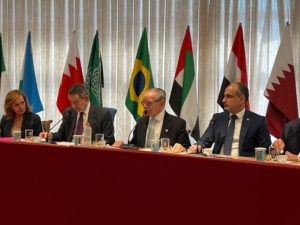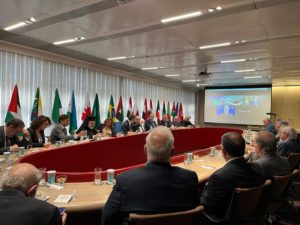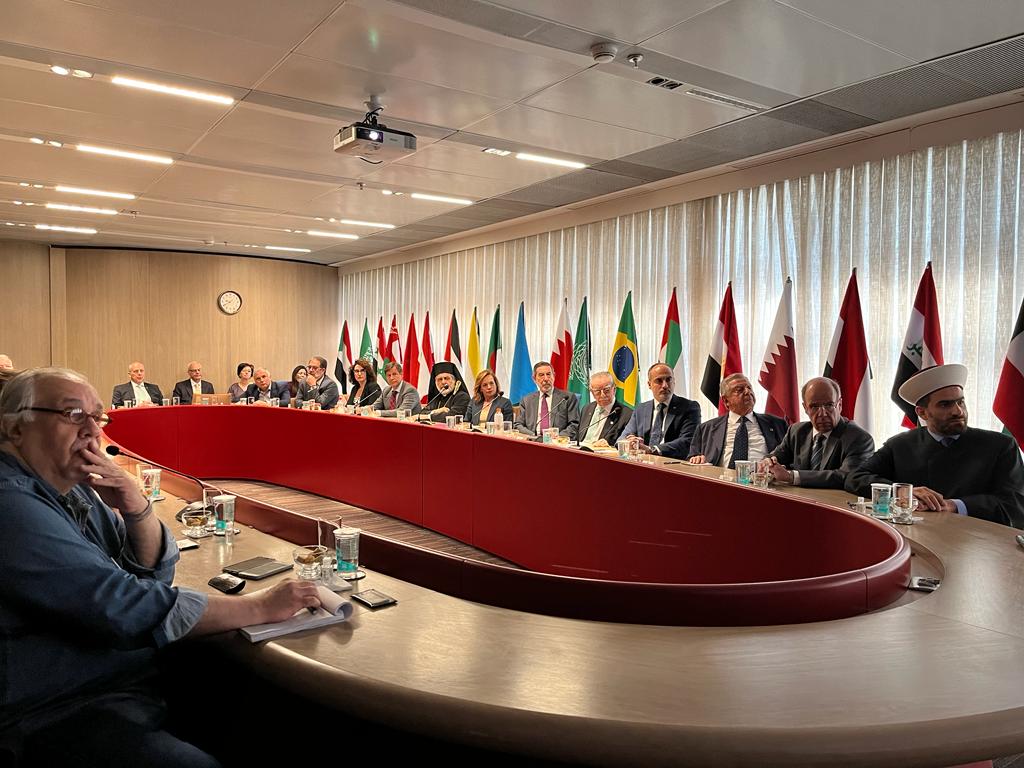São Paulo – This Thursday morning (27), Rotary launched the Light for the Future [Luz para o Futuro] project at the Arab Brazilian Chamber of Commerce (ABCC) headquarters in São Paulo, which aims to install photovoltaic panels in schools in Lebanon. The Arab country is facing an energy crisis and only has one to two hours of electrical power daily. The initiative’s goal in Brazil is to raise USD 150,000 to help the first ten schools.

Representing Rotary, director treasurer Nahid Chicani and former director Antonio Hallage spoke at the meeting. ABCC president Osmar Chohfi opened the event. The event also had speeches by the chargé d’affaires of the Lebanese Embassy to Brasília, Carla Jazzar; the consul general of Lebanon to São Paulo, Rudy El Azzi; the ABCC’s International Relations vice president and representative on the committee of the investment fund for Lebanon, Mohamad Mourad; and others.
Participating in the event over the internet were the governor of the Rotary International District of Lebanon, George Azar; former Rotary International District governor, Jamil Mouawad; Rotary Foundation trustee of Rotary International, Marcelo Haick; District 2452 representative, Ahmad Housseini; and in a video recording, the former president of Brazil, Michel Temer.
Azar brought information about this international project to install solar energy panels in public schools in Lebanon, and Mouawad spoke on the project’s technical details. Michel Temer asked the Lebanese for contributions for his Lebanese brothers, who have been facing many hardships. Nahid Chicani spoke on the challenges Lebanese schools have been facing with the lack of electrical power.
Ambassador Carla Jazzar said Lebanon is going through a time of significant hardship and trial, and the situation requires efforts from individuals, communities, and institutions. According to her, the Community Fund for Lebanon aims to provide humanitarian aid directly to Lebanon and projects that can contribute to its reconstruction. She informed the Light for the Future project is aligned with the United for Lebanon Group.
“Our schools are suffering, and this proposal to install solar panels would help; it is a great investment in Lebanon’s future. We are working to facilitate projects like this, trying to reduce the costs of sending humanitarian donations outside the country,” said Jazzar.

Antonio Hallage said this is an opportunity to show how much the Brazilian-Arab community reveres their country of origin. According to him, the Light for the Future pilot project was implemented at The Lebanese School for the Blind and Deaf in Baabda, Lebanon. Sixty-six photovoltaic panels were supplied, among other equipment and labor. Rotary International’s idea is to raise USD 700,000 to help about 60 schools a year, according to Hallage.
Rudy El Azzi said the initiative is innovative not only because it helps with solar energy but because it is sustainable and helps in education and the environment. “The project has all the elements of success because it is helping the Lebanese people, children, and disabled,” he said.
George Azar of Rotary Lebanon said no matter how brilliant a student or teacher is, a child will not be able to learn without electricity. “We want to install panels in as many schools as we can. With your help, we can help Lebanese children have a strong education and guarantee the future of our country,” he said.

According to Jamil Mouawad, a budget of around USD 15,000 will be needed for each school. Over four to five years, 1,500 Lebanese schools could be reached. Marcelo Haick said to complete the aid package for the first ten schools, a donation of USD 150,000 would be required.
Ambassador Osmar Chohfi said the project effectively and efficiently demonstrates Rotary’s humanitarian aid activity. The Rotary initiative has the support of the ABCC and the United for Lebanon group.
The meeting was attended by around 40 participants, including ABCC directors Alessandra Frisso, Claudia Yazigi Haddad, and cultural director Silvia Antibas, in addition to director William Atui; and the president of Brazil’s Bandeirantes communications group, Johnny Saad.
Translated by Elúsio Brasileiro




